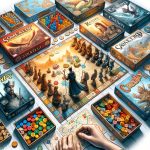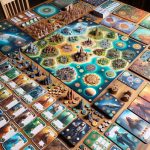Do you like to talk about strategy board games and the impact they have on social interaction? Strategy board games have been a popular form of entertainment for centuries, captivating players with their challenging gameplay and thought-provoking strategies. In this article, we will explore the history of strategy board games, their popularity, and the benefits they provide in terms of mental exercise, critical thinking, problem-solving skills, and social interaction.
From ancient civilizations to modern innovations, strategy board games have continued to evolve and capture the interest of people from all walks of life. Whether it’s the complexity of chess or the diplomatic negotiations in Settlers of Catan, these games offer a unique blend of entertainment and intellectual stimulation.
In addition to providing mental exercise, strategy board games also play a significant role in enhancing social skills and communication. The inherent need for cooperation, negotiation, and strategic planning fosters an environment where players can develop their interpersonal skills while engaging in friendly competition. Join us as we delve into the allure of strategy board games and their lasting impact on cognitive development and social dynamics.
The History of Strategy Board Games
Strategy board games have a rich and fascinating history that dates back to ancient civilizations. In fact, some of the earliest known board games were played in Egypt over 5,000 years ago. These early games, such as Senet and Mehen, were not only sources of entertainment but also had religious and social significance. As civilizations rose and fell, so too did the popularity of board games, with each culture adding its own unique twist to the gameplay.
Throughout history, strategy board games have evolved alongside advancements in technology and society. During the Middle Ages in Europe, popular games like Chess and Backgammon emerged as symbols of status and intellect among the nobility. The industrial revolution brought about innovations in manufacturing that made board games more accessible to the masses. In the 20th century, iconic strategy board games like Risk and Monopoly captured the imagination of players worldwide.
Today, we continue to see innovation in strategy board games with modern classics like Settlers of Catan and Ticket to Ride captivating a new generation of players. Additionally, advancements in digital technology have given rise to online platforms where players can engage in virtual board game communities and participate in global tournaments. These advancements have brought about a resurgence of interest in strategy board games as both a recreational activity and a means of social interaction.
- Ancient civilization
- Senet
- Mehen
- Middle Ages
- Chess
- Backgammon
- Industrial revolution
- Accessibility to the masses
- Modern era
- Settlers of Catan
- Ticket to Ride
The Top 5 Most Popular Strategy Board Games of All Time
When it comes to strategy board games, there are a few titles that have stood the test of time and continue to be loved by players all around the world. These games have a special place in the hearts of enthusiasts and have paved the way for the modern board gaming industry. Here are the top 5 most popular strategy board games of all time:
1. Chess: Dating back to the 6th century, chess is a game of skill, patience, and foresight. With its simple yet deep mechanics, chess has been a staple in competitive gaming and continues to be a favorite among players who enjoy complex strategy.
2. Settlers of Catan: This game introduced the concept of resource management and trading in board gaming. Settlers of Catan has gained widespread popularity for its innovative gameplay and replay value, making it a must-have for any serious board game collection.
3. Risk: A classic game of world domination, Risk has been capturing players’ imaginations since its release in 1957. The strategic depth and negotiation aspects of Risk have made it an enduring favorite among fans of conflict-based strategy games.
4. Ticket to Ride: A more recent addition to the world of strategy board games, Ticket to Ride has quickly become a beloved classic due to its accessible gameplay and easy-to-understand mechanics. Players compete to build train routes across North America, adding an engaging element of competition and planning.
5. Terraforming Mars: In this modern classic, players take on the role of corporations working together to terraform Mars and make it habitable for human life. With deep strategic choices and multiple paths to victory, Terraforming Mars has earned a dedicated following within the board gaming community.
Whether you’re a fan of traditional war games like Risk or prefer more modern Euro-style titles like Settlers of Catan, these top 5 strategy board games offer something for every type of player. Each game offers unique challenges that test players’ critical thinking skills while providing an opportunity for social interaction and friendly competition with fellow enthusiasts. Which one is your favorite?
Benefits of Playing Strategy Board Games
Playing strategy board games can be more than just a fun pastime; it can also provide numerous mental and cognitive benefits. Engaging in these types of games requires players to think critically, plan ahead, and solve complex problems. Whether it’s devising a winning strategy or adapting to the moves of opponents, strategy board games offer a unique blend of entertainment and mental exercise.
One of the key benefits of playing strategy board games is the mental stimulation they provide. By challenging the mind to think strategically and make calculated decisions, these games can help improve cognitive functions such as memory, concentration, and analytical skills. Additionally, the problem-solving aspect of strategy board games encourages players to think creatively and adapt to ever-changing game scenarios. These mental exercises can have long-lasting effects on brain health and overall cognitive development.
Furthermore, engaging in strategy board games can also enhance critical thinking skills. Players are often required to evaluate various options, weigh potential outcomes, and make decisions based on careful consideration.
This type of thinking is not only valuable during gameplay but also beneficial in real-life situations such as problem-solving at work or making important decisions in personal life. It’s no wonder that many educators and parents encourage the use of strategy board games as a tool for developing critical thinking skills in children and young adults.
| Benefit | Description |
|---|---|
| Mental Stimulation | Challenges the mind to think strategically and improve cognitive functions. |
| Critical Thinking Skills | Enhances the ability to evaluate options, weigh outcomes, and make informed decisions. |
| Problem-Solving | Encourages creative thinking and adaptation to different game scenarios which can be applied to real-life situations. |
How Strategy Board Games Enhance Social Skills and Communication
For many enthusiasts, strategy board games are not only a source of entertainment but also a platform for fostering social interaction and communication. Whether it’s bantering about game tactics or engaging in friendly competition, strategy board games have the unique ability to bring people together and enhance their social skills in various ways.
Playing strategy board games often involves negotiation, persuasion, and decision-making, all of which are essential components of effective communication. Whether it’s convincing opponents to form alliances or strategizing with teammates, these games require players to articulate their thoughts and express their ideas clearly. This fosters an environment where individuals can practice and improve their verbal communication skills in a non-threatening and enjoyable setting.
Furthermore, strategy board games provide an opportunity for individuals to develop empathy and understanding towards others. By engaging in gameplay that involves teamwork or competition, players learn to navigate different personalities, perspectives, and strategies. This promotes the development of emotional intelligence and the ability to effectively communicate with a diverse range of individuals.
In addition to verbal communication, strategy board games also promote non-verbal communication skills such as body language and facial expressions. Whether it’s reading an opponent’s tells or conveying subtle cues to allies, players must hone their awareness of non-verbal signals-an essential skill for effective communication beyond the gaming table. In this sense, strategy board games serve as a practical medium for enhancing both verbal and non-verbal communication abilities.
- Strategy board games promote negotiation, persuasion, and decision-making skills
- Players learn to empathize with others by engaging in teamwork or competition
- Non-verbal communication skills such as body language and facial expressions are honed through gameplay
Strategy Board Games as a Tool for Team Building and Leadership Development
Strategy board games aren’t just for entertainment; they also serve as a valuable tool for team building and leadership development. Whether it’s in a corporate setting, educational institution, or even within a group of friends, these games offer an opportunity to develop essential skills and foster teamwork.
Enhancing Collaboration and Problem-Solving Skills
One of the key benefits of using strategy board games for team building is the enhancement of collaboration and problem-solving skills. Games like Pandemic require players to work together to find solutions to complex problems, teaching individuals the importance of pooling resources and expertise to achieve a common goal. Through this process, participants learn how to communicate effectively, delegate tasks, and think critically under pressure – all essential skills for effective teamwork in any setting.
Leadership Development and Decision-Making
Additionally, strategy board games provide a platform for leadership development and decision-making. In games such as Settlers of Catan, players must make crucial decisions that impact both their own progress and the overall success of their team. This allows individuals to practice making strategic choices, weighing risks, and considering long-term consequences – all vital components of effective leadership. By engaging in these games, participants can hone their ability to lead others and make sound decisions in high-pressure situations.
Fostering Trust and Communication
Lastly, strategy board games are instrumental in fostering trust and communication within a group. Throughout gameplay, individuals must rely on each other’s word, collaborate openly, and navigate conflict constructively. These interactions build a foundation of trust among team members while also sharpening their communication skills. As a result, participants develop stronger relationships with one another built on transparency, accountability, and mutual respect – qualities crucial for cohesive teamwork in any environment.
Strategy Board Games in the Digital Age
In today’s digital age, strategy board games have found a new platform for players to connect and engage with one another. Online platforms, communities, and tournaments have revolutionized the way people enjoy and interact with these games. With the rise of technology, players no longer need to be in the same physical location to enjoy their favorite board games. Instead, they can connect virtually from anywhere in the world, allowing for a diverse and global community of players.
Online platforms such as Board Game Arena and Tabletopia offer a wide range of strategy board games that can be played digitally. This not only provides convenience and accessibility for players but also introduces them to new games they may not have had the opportunity to try before. Additionally, these platforms often include features that allow users to communicate with each other during gameplay, creating a space for discussion and social interaction.
Furthermore, online communities centered around strategy board games provide a space for enthusiasts to share their experiences, strategies, and tips with like-minded individuals. These communities serve as a valuable resource for both new and experienced players looking to deepen their understanding of different game mechanics and strategies.
Additionally, they contribute to fostering a sense of camaraderie and shared passion among players who may not have had the opportunity to connect otherwise. Lastly, online tournaments organized through these platforms give players the chance to test their skills against others in a competitive setting while also building connections with fellow participants.
Conclusion
In conclusion, strategy board games have proven to be more than just a source of entertainment. From ancient civilizations to the modern innovation of digital platforms and online communities, these games have stood the test of time and continue to captivate players of all ages.
The cognitive benefits of playing strategy board games cannot be overlooked, as they provide mental exercise, critical thinking, and problem-solving skills that are essential for personal development. Additionally, the social aspect of these games fosters communication and collaboration, making them an invaluable tool for enhancing social skills.
Furthermore, strategy board games are not just limited to casual play but can also serve as a powerful tool for team building and leadership development. The challenges presented in these games require strategic thinking, decision-making, and coordination among teammates, which are crucial skills in any professional setting. By engaging in these games, individuals can develop a deeper understanding of teamwork and effective communication that can be applied in their personal and professional lives.
As we embrace the art of strategy board games, it is evident that their lasting impact on cognitive development and social dynamics cannot be overstated. Whether it’s gathering around a physical board or joining an online tournament, the appeal of strategy board games is undeniable.
So the next time someone asks “Do you like to talk about strategy board games? “, you can confidently share how these games provide not only hours of fun but also countless opportunities for growth and learning.
Frequently Asked Questions
What Do People Like About Strategy Games?
People like strategy games because they challenge the mind and require critical thinking. Strategy games offer a chance to outsmart opponents, make tactical decisions, and experience a sense of accomplishment.
Why Is Strategy Important in Board Games?
Strategy is important in board games because it adds depth and complexity to the gameplay. It allows players to think ahead, consider various options, and develop their decision-making skills. Without strategy, board games would lack the element of challenge.
What Do You Like About Board Games?
What I like about board games is the social interaction they provide. Gathering around a table with friends or family creates a fun and engaging atmosphere. Board games also offer a break from screens and technology, allowing for quality face-to-face time.

I love playing all kinds of games – from classics like Monopoly to modern favourites like Ticket to Ride.
I created this blog as a way to share my love of board games with others, and provide information on the latest releases and news in the industry.





